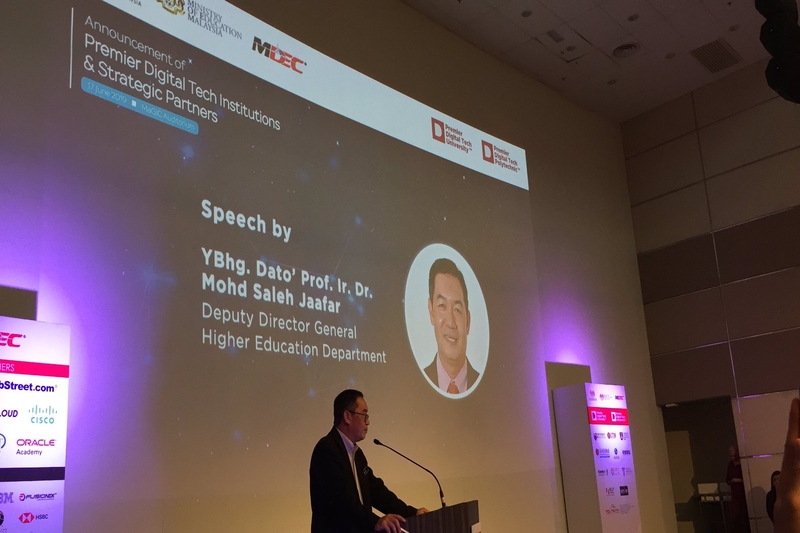
The Malaysian government recognised three additional universities – HELP University, International Islamic University Malaysia and Tunku Abdul Rahman University – as Premier Digital Tech Institutions, with aims to meet the demands of the digital economy, according to a report.
This means that the existing line-up has been expanded to a total of 11 universities and five polytechnics with such status.
The Institutions of higher learning are now required to fulfil a set of requirements. For example, their position on global rankings, industry-relevant teaching and learning methodologies, effective career placement services, teaching staff with industry experience and industry involvement throughout the undergraduate journey.
The Deputy Director General of the Ministry of Education stated, at the launch at Cyberjaya, that the Premier Digital Tech Institutions initiative will ensure Malaysians will be ready for the fields of Data Analytics, Artificial Intelligence, Robotics and Digital Marketing.
It was noted that talent is key for Malaysia to succeed in the Fourth Industrial Revolution. As the world moves rapidly from IR4.0 to now even discussing IR 5.0, it is critical that Malaysia prepares skilled local talents for future jobs.
Launched in 2017, the Premier Digital Technology Institutions initiative aimed to meet the huge demands for industry-ready computer science graduates.
The other local universities earlier recognised with the Premier Digital Tech University status are University of Malaya (UM), Universiti Teknologi Malaysia (UTM), Universiti Teknologi MARA (UiTM), Taylor’s University, Sunway University, Multimedia University (MMU), Tunku Abdul Rahman University College (TAR UC), and Asia Pacific University (APU).
The five polytechnics awarded the Premier Digital Tech Polytechnics status are PoliteknikUngku Omar in Perak, Politeknik Balik Pulau in Penang, PoliteknikMersing in Johor, PoliteknikSultan Idris Shah in Selangor, and PoliteknikSultan Mizan Zainal Abidin in Terengganu.
Eight industry partners were recognised at yesterday’s event for offering free cloud credits, training modules, certification programmes, training, mentoring and employment tools to the Institution.
According to the CEO of the Malaysian Digital Economy Corporation (a government agency under the Ministry of Communications and Multimedia tasked to lead the country’s digital economy forward), the initiative helped grow the number of enrolled students from 15,500 to 22,000 and produced 6,000 tech graduates last year.
She emphasised roles these institutions play in enhancing graduates’ employability. She noted that tech CEOs in a roundtable earlier this year highlighted the need for more hybrid skills, such as problem-solving, critical thinking, communications and the right attitude (for example, resilience, growth mindset, etc).
In 2018, Premier Digital Tech Institutions’ graduates recorded a 95 per cent employability rate, earning a salary 1.5 times higher than the national average.
It is clear that talent is being better prepared by the bringing together of the best educational institutions and industry players.
The recent announcement of the expanded Premier Digital Tech Institutions line-up together with strong support from leading players in the industry shows that Malaysia is on the right path to futureproof its talents, creating leaders and innovators that will drive global digital economies of the future.
Referring to the Emerging Jobs in Malaysia Report 2019 by an American business and employment-oriented service, it was also noted that four out of five emerging jobs in high demand in the country are digital in nature.
The employment services firm’s data also suggests digital jobs in non-digital tech sectors are growing at “five times that of digital tech sectors in the Asia Pacific”.
According to news coverage, the Emerging Jobs Report noted that digital competency is in high demand, the world’s largest professional network stated.
The findings underscore the demand for jobs which require hybrid skills, primarily to help organisations in Malaysia navigate their digital transformation journey.
Moreover, it was noted that the challenge for companies is to identify and hire talents with these hybrid skills or provide opportunities for existing employees to learn via upskilling or reskilling.
Thus, the Premier Digital Technology Institutions initiative will help to bridge this gap; it will help create and support tech talent in Malaysia to ensure that it can meet the challenges of the digital era.
















